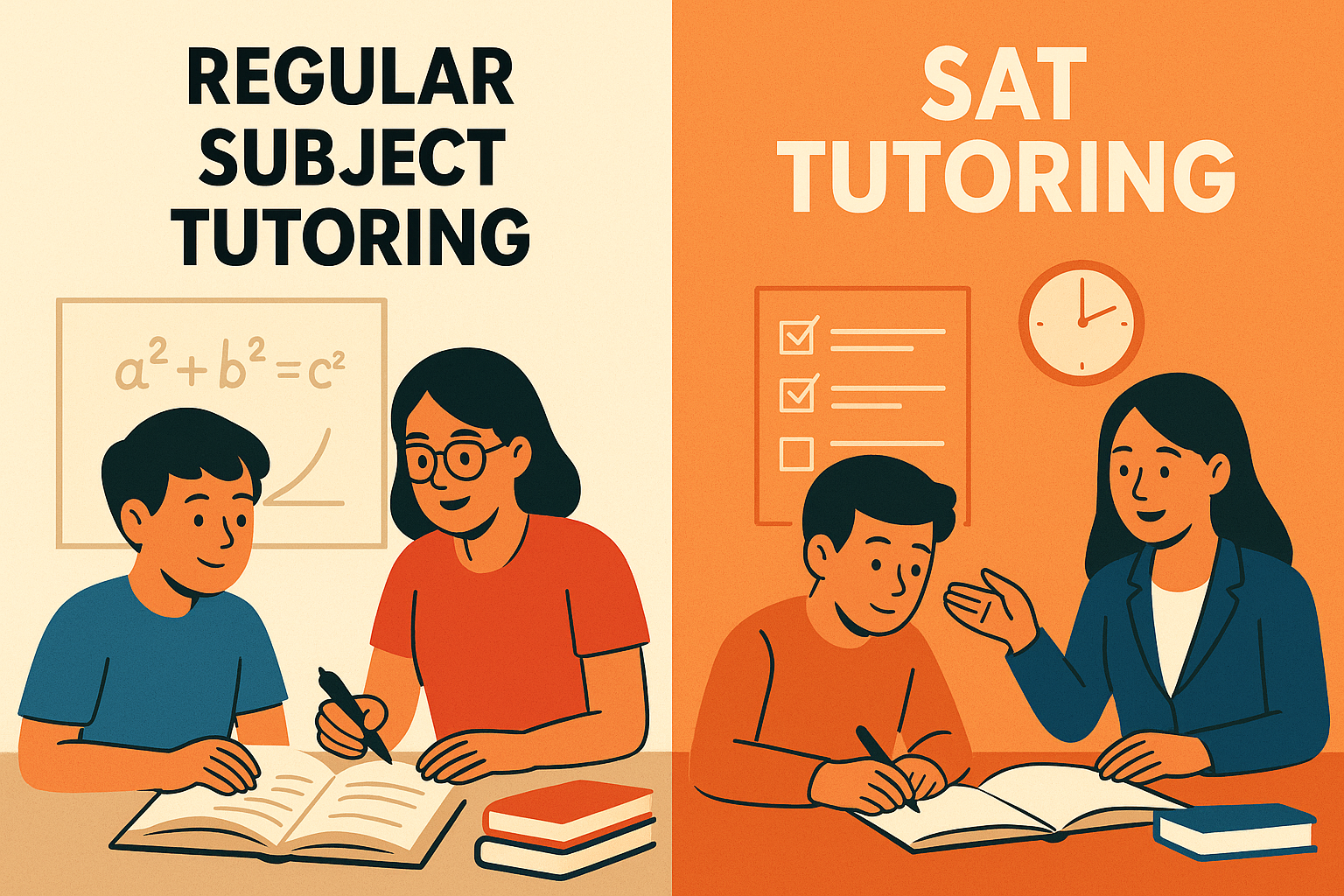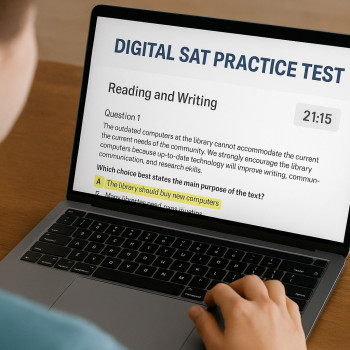Are you a high school student wondering if your excellent math and English grades will automatically translate to a stellar SAT score? Or perhaps you’re a parent considering whether your child needs specialized SAT preparation beyond their regular academic tutoring? Here’s the reality that catches thousands of students off guard every year: being academically strong doesn’t guarantee SAT success.
The SAT isn’t just another school exam—it’s a strategic battlefield that requires specialized training, unique mindset shifts, and test-specific skills that regular subject tutoring simply doesn’t provide. Understanding this fundamental difference could be the key to unlocking admission to your dream college.
In this comprehensive guide, we’ll explore exactly why SAT tutoring stands apart from traditional academic support, what makes standardized test preparation so unique, and how you can leverage this knowledge to maximize your college admissions potential.
The Fundamental Difference: Academic Mastery vs. Strategic Test Performance
What Regular Subject Tutoring Actually Does
Traditional academic tutoring focuses on building deep, comprehensive knowledge in specific subjects. When you work with a math tutor, for instance, the primary goals include:
- Conceptual Mastery: Understanding the “why” behind mathematical principles and formulas
- Problem-Solving Depth: Learning multiple approaches to solve complex problems
- Academic Confidence: Building long-term subject expertise that serves you throughout your education
- Curriculum Alignment: Preparing for school exams, board tests, and grade-specific requirements
- Knowledge Retention: Ensuring information sticks for future academic pursuits
This approach is invaluable for academic success. A good subject tutor might spend weeks helping you master calculus derivatives, ensuring you understand every nuance and can tackle any variation of the problem. This depth of knowledge serves you well in classroom settings where you have ample time to demonstrate your understanding.
How SAT Tutoring Operates Differently
SAT preparation, however, operates on an entirely different paradigm. Instead of pursuing comprehensive subject mastery, SAT tutoring focuses on strategic optimization. Here’s what this means in practice:
Time-Pressure Training: Every SAT section has strict time limits. You’re not rewarded for showing elegant work or demonstrating deep conceptual understanding—you’re rewarded for getting the right answer quickly and efficiently.
Pattern Recognition: SAT questions follow predictable patterns. A skilled SAT tutor teaches you to recognize these patterns instantly, allowing you to apply the most efficient solution method immediately.
Strategic Decision-Making: Not all SAT questions are worth the same time investment. Learning when to skip, when to guess, and when to invest extra time is crucial for score maximization.
Stress Management Under Pressure: The SAT is a high-stakes, timed environment unlike most classroom experiences. SAT tutoring specifically prepares you for this psychological challenge.
Why Academic Excellence Doesn’t Guarantee SAT Success
Many students and parents assume that strong grades automatically translate to high SAT scores. This misconception leads to disappointment and missed opportunities. Here’s why academic strength alone isn’t sufficient:
Different Evaluation Methods
School Exams typically:
- Allow extended time periods
- Test one subject area thoroughly
- Reward detailed explanations and process work
- Often allow calculators and reference materials
- Focus on curriculum-specific content
The SAT instead:
- Imposes strict time constraints across all sections
- Mixes multiple subject areas within single sections
- Rewards quick, accurate answers regardless of method
- Limits calculator use to specific sections
- Tests reasoning ability across diverse contexts
The Efficiency vs. Accuracy Trade-off
In school, you’re taught to value accuracy above all else. Taking your time, showing all work, and double-checking answers are praised behaviors. On the SAT, this approach can be counterproductive.
Consider this real scenario: A student who consistently earns A+ grades in Advanced Placement Calculus might struggle with seemingly “easier” SAT math problems simply because they’re spending too much time ensuring perfect accuracy on early questions, leaving insufficient time for later problems they could easily solve.
SAT tutoring teaches the critical skill of strategic efficiency—getting problems right quickly enough to attempt all questions while maintaining acceptable accuracy levels.
Understanding SAT Structure: Why Test Familiarity Matters
The Digital SAT Revolution
Since 2024, the SAT has undergone significant changes that make specialized preparation even more crucial:
Adaptive Testing: The digital SAT adjusts question difficulty based on your performance, meaning your approach to each section directly impacts the questions you’ll see later.
Shorter Duration: While the test is now approximately 2 hours and 14 minutes (down from over 3 hours), the time pressure per question remains intense.
Digital Navigation: Students must now be comfortable with on-screen reading, digital tools, and computer-based test-taking strategies.
New Question Formats: The digital format introduces question types and interaction methods unfamiliar to students who’ve only experienced traditional paper-and-pencil testing.
Section-Specific Strategic Demands
Each SAT section requires unique strategic approaches that regular tutoring doesn’t address:
Reading and Writing Section:
- Rapid passage analysis and comprehension
- Evidence-based reasoning skills
- Context-dependent vocabulary understanding
- Grammar application in realistic writing scenarios
Math Section:
- Seamless switching between algebra, geometry, statistics, and advanced topics
- Calculator vs. non-calculator strategic decisions
- Data interpretation and analysis
- Real-world problem-solving applications
The Psychology of Standardized Test Performance
Mindset Transformation
One of the most significant differences between regular tutoring and SAT preparation is the required mindset shift:
Traditional Academic Mindset:
- “I need to understand every concept completely”
- “Making mistakes means I haven’t learned properly”
- “I should spend as much time as needed to get the right answer”
- “Showing my work is as important as the final answer”
SAT Success Mindset:
- “I need to maximize my score within the given constraints”
- “Strategic guessing and skipping are valuable tools”
- “Time management is as important as content knowledge”
- “Some questions are deliberately meant to be challenging or time-consuming”
Building Test-Taking Resilience
The SAT tests not just your academic knowledge but your ability to perform under pressure. Regular tutoring rarely simulates this high-stakes environment. SAT-specific preparation includes:
Stamina Building: Training to maintain focus and accuracy across multiple hours of testing
Stress Inoculation: Practicing under timed, high-pressure conditions to reduce test-day anxiety
Recovery Strategies: Learning how to bounce back from difficult sections or unexpected challenges
Confidence Calibration: Developing realistic expectations and maintaining composure throughout the exam
The 80/20 Rule: Strategic Content Focus
High-Yield vs. Low-Yield Topics
Regular subject tutoring often aims for comprehensive coverage, but SAT preparation benefits from strategic focus. Research shows that approximately 80% of SAT score improvements come from mastering the 20% of content areas that appear most frequently.
High-Yield SAT Math Topics:
- Linear equations and systems
- Quadratic functions and equations
- Ratios, proportions, and percentages
- Basic statistics and data interpretation
- Coordinate geometry fundamentals
High-Yield Reading and Writing Topics:
- Main idea and supporting evidence questions
- Vocabulary in context
- Command of evidence
- Standard English conventions
- Expression of ideas
Lower-Yield Areas That Regular Tutoring Might Emphasize:
- Advanced trigonometry identities
- Complex number operations
- Extensive literary analysis techniques
- Obscure grammar rules
Diagnostic-Driven Preparation
Modern SAT tutoring leverages technology and data analytics to optimize preparation efficiency:
Initial Diagnostic Assessment: Identifying specific strengths and weaknesses across all tested areas
Adaptive Learning Platforms: Focusing practice time on areas with the highest potential for score improvement
Progress Tracking: Monitoring improvement rates and adjusting strategies accordingly
Predictive Scoring: Using practice test data to project likely score ranges and set realistic goals
Technology Integration in Modern SAT Preparation
Digital Tools and Resources
Contemporary SAT tutoring incorporates sophisticated technological resources that regular tutoring typically doesn’t utilize:
AI-Powered Practice Systems: These platforms adapt to individual learning patterns and focus on areas needing improvement
Full-Length Digital Simulations: Exact replicas of the actual testing environment help students become comfortable with the digital format
Performance Analytics: Detailed breakdowns of timing, accuracy, and strategic decision-making across practice sessions
Mobile Learning Integration: Allowing for flexible, consistent practice that fits busy student schedules
Real-Time Feedback and Adjustment
Unlike traditional tutoring, which might address mistakes after they’ve been made, modern SAT preparation provides immediate feedback and strategy adjustments during practice sessions.
When to Choose SAT Tutoring Over Regular Subject Tutoring
Clear Indicators You Need Specialized SAT Preparation
Score Plateaus: If your SAT scores have stopped improving despite continued study
Time Management Issues: Consistently running out of time on practice tests or sections
Strategy Unfamiliarity: Lack of exposure to test-specific techniques like process of elimination, strategic guessing, or passage mapping
Test Anxiety: High stress levels specifically related to standardized testing environments
Significant Score Goals: Needing substantial score improvements within limited timeframes
College Admissions Timeline Pressure: When SAT scores are critical for specific application deadlines
The Optimal Combined Approach
The most successful students often employ a strategic combination:
- Foundation Building: Regular subject tutoring to ensure solid academic fundamentals
- Strategy Development: SAT-specific tutoring to learn test-taking techniques and time management
- Practice Integration: Consistent practice testing to build stamina and familiarity
- Performance Analysis: Regular assessment and strategy adjustment based on progress data
Global Perspective: SAT Preparation Worldwide
Universal Principles Across Different Educational Systems
Whether you’re preparing in the United States, India, the United Kingdom, the Middle East, or anywhere else globally, certain SAT preparation principles remain consistent:
Cultural Academic Differences: Students from different educational backgrounds bring varying strengths and challenges to SAT preparation
Time Zone Considerations: International students often benefit from flexible, online SAT tutoring options that accommodate different schedules
College Application Integration: Understanding how SAT scores fit into broader international college application strategies
Maximizing Your SAT Preparation Investment
Setting Realistic Expectations and Goals
Effective SAT tutoring begins with honest assessment and goal setting:
Current Score Analysis: Understanding where you stand relative to your target schools’ expectations
Improvement Timeline: Realistic projections based on starting scores, available preparation time, and target goals
Resource Allocation: Balancing SAT preparation with other academic and extracurricular commitments
Measuring Success Beyond Score Increases
While score improvement is the primary goal, effective SAT tutoring also develops:
- Enhanced time management skills applicable to college coursework
- Improved analytical reading abilities
- Stronger mathematical reasoning capabilities
- Better performance under pressure
- Increased confidence in test-taking situations
Conclusion: Making the Strategic Choice for Your Future
The distinction between regular subject tutoring and SAT preparation isn’t just academic—it’s strategic. Your success on the SAT requires more than knowledge; it demands the ability to apply that knowledge efficiently, strategically, and under pressure.
Understanding this difference empowers you to make informed decisions about your test preparation approach. While strong academic foundations remain essential, they must be complemented by test-specific strategies, time management skills, and psychological preparation that only specialized SAT tutoring provides.
Whether you’re just beginning your SAT journey or looking to break through score plateaus, recognizing the unique demands of standardized test preparation is your first step toward achieving the scores that can open doors to your dream universities.
The SAT rewards strategic thinking as much as academic knowledge. By investing in specialized preparation that addresses both dimensions, you’re not just preparing for a test, you’re developing skills and mindsets that will serve you throughout your academic and professional career.
Ready to transform your SAT preparation strategy? The difference between good scores and great scores often lies in understanding exactly what the test demands and training accordingly. Your academic strength provides the foundation, but SAT-specific preparation builds the bridge to your college admissions success.













No Comments
Leave a comment Cancel